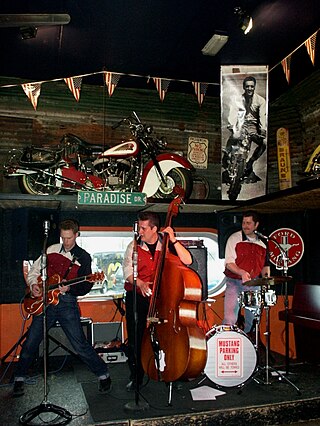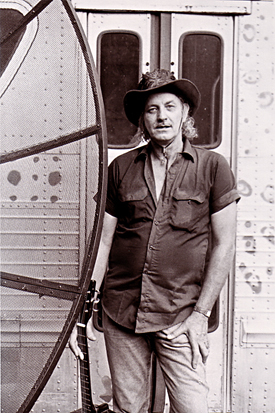
Scottsville is a home rule-class city in Allen County, Kentucky, in the United States. It is the seat of its county. The population was 4,299 during the 2020 United States Census.

Ashland is a home rule-class city in Boyd County, Kentucky, United States. The most populous city in Boyd County, Ashland is located upon a southern bank of the Ohio River at the state border with Ohio and near West Virginia. The population was 21,625 at the 2020 census. Ashland is a principal city of the Huntington–Ashland metropolitan area, referred to locally as the "Tri-State area", home to 376,155 residents as of 2020. Ashland serves as an important economic and medical center for northeastern Kentucky.

Rockabilly is one of the earliest styles of rock and roll music. It dates back to the early 1950s in the United States, especially the South. As a genre, it blends the sound of Western musical styles such as country with that of rhythm and blues, leading to what is considered "classic" rock and roll. Some have also described it as a blend of bluegrass with rock and roll. The term "rockabilly" itself is a portmanteau of "rock" and "hillbilly", the latter a reference to the country music that contributed strongly to the style. Other important influences on rockabilly include western swing, boogie-woogie, jump blues, and electric blues.

The National Statuary Hall is a chamber in the United States Capitol devoted to sculptures of prominent Americans. The hall, also known as the Old Hall of the House, is a large, two-story, semicircular room with a second story gallery along the curved perimeter. It is located immediately south of the Rotunda. The meeting place of the U.S. House of Representatives for nearly 50 years (1807–1857), after a few years of disuse it was repurposed as a statuary hall in 1864; this is when the National Statuary Hall Collection was established. By 1933, the collection had outgrown this single room, and a number of statues are placed elsewhere within the Capitol.

John LaGale Horton was an American country, honky tonk and rockabilly musician during the 1950s. He is best known for a series of history-inspired narrative country saga songs that became international hits. His 1959 single "The Battle of New Orleans" was awarded the 1960 Grammy Award for Best Country & Western Recording. The song was awarded the Grammy Hall of Fame Award and in 2001 ranked No. 333 of the Recording Industry Association of America's "Songs of the Century". His first No. 1 country song was in 1959, "When It's Springtime in Alaska ".

Hasil Adkins was an American singer-songwriter and multi-instrumentalist. His genres include rock and roll, country, blues and more commonly rockabilly, and because of his unusual playing and singing style, he is often cited as an example of outsider music. He generally performed as a one-man band, playing guitar and drums at the same time.
Wyatt Merle Kilgore was an American singer, songwriter, and manager. Born in Chickasha, Oklahoma, he was raised in Shreveport, Louisiana. At the time of his death, he was the personal manager of Hank Williams Jr.

Clyde Julian "Red" Foley was an American musician who made a major contribution to the growth of country music after World War II.

Billy Zoom is an American guitarist, best known as one of the founders of the punk rock band X.

Joseph Craft III is an American businessman. He is the president and chief executive officer of Alliance Resource Partners, L.P., the third-largest coal producer in the eastern United States.
William C. Hancock Jr. was an American singer, guitarist, bassist and multi-instrumental recording artist. He has made numerous recordings, primarily in the rockabilly genre but also has a large body of recorded work in rock 'n' roll, blues, jazz, rhythm & blues, and country music. He performed live primarily in the Washington, D.C., area, but also played regularly at European roots music festivals.
The Enterprise Association of Regular Baptists is an association of the Regular Baptist Church. Even though they don't have any other Regular Baptist associations that correspond with them in their yearly meetings, they do correspond with two United Baptist associations: one from Salt Rock, West Virginia, and the other from Missouri. They also have relationships between different Free Will Baptist conferences throughout Ohio. The association has a total of 48 member churches, which are scattered through Southern Ohio and Eastern Kentucky. The association was organized in Enterprise Johnson County, Kentucky in 1894 and was incorporated in 1955, after relocating to Gallipolis, Ohio. Different churches originally hosted the association's annual meetings, but in 1995 the Enterprise Association moved its annual meeting place to the Enterprise Baptist Youth Camp in Gallipolis. The association always has their meetings from the first weekend in August (Thursday–Saturday.
The 1965 College Football All-America team is composed of college football players who were selected as All-Americans by various organizations that chose College Football All-America Teams in 1965.
Joe J. Chevalier, known as Jay Chevalier, was an American singer and songwriter from Louisiana who achieved success in several musical genres since the late 1950s. A pioneer of rockabilly music, he is best known within Louisiana for his songs based on politics, sports, and his love for his home state. The first "Official State Troubadour," he is an inductee to the Rockabilly Hall of Fame, the Louisiana Music Hall of Fame, Songwriters Hall of Fame, and the Louisiana Political Museum and Hall of Fame
Melber is an unincorporated community in Graves and McCracken counties in the U.S. state of Kentucky.

Hot Spot is an unincorporated community and former coal town in Letcher County, Kentucky, United States. It was named for the Hot Spot Coal Company. Other names for the community have been Smoot Creek, Dalna, Elsiecoal, and Premium. It has frequently been noted on lists of unusual place names.
Athertonville is an unincorporated community located in LaRue County, Kentucky, United States. The community was originally named Medcalf when first established in April 1884, but was renamed the following month to Athertonville.

Herbert Paul Gilley was an American country music lyricist and promoter from Kentucky. In his lifetime, he was little known as a songwriter, but decades after his death by drowning at age 27, he was identified more widely as likely having written the lyrics to a dozen famous songs, including two that were hits for Hank Williams: "Cold, Cold Heart" and "I'm So Lonesome I Could Cry". He may have also written "I Overlooked an Orchid", which was a number-one country hit in 1974 for Mickey Gilley. Other songs that have been attributed to Gilley include "If Teardrops Were Pennies", "Don't Let the Stars Get in Your Eyes", and "Crazy Arms".
Willie Murray Adams was an American rockabilly musician and a member of the Rockabilly Hall of Fame. He recorded the 1950s song "Rock, Pretty Mama", recognized as "a seminal rockabilly classic" by critics. Other songs he recorded in the 1950s include "You Heard Me Knocking", "True Love Will Come Your Way", and "You Gotta Have a Duck Tail". He toured with his family band for decades and, as his rockabilly interest declined, he entered the ministry and wrote Gospel songs. He made a comeback late in his career when a collection of 27 of Adams' songs was released in 2002. Fans re-embraced his rockabilly music 45 years after the original recordings, igniting demand for his appearances at music festivals in U.S. and Britain. Adams died March 30, 2019, at age 79.
Paul "Buster" Sanderford is a retired college basketball coach who coached from the 1970s to 2000s. From 1976 to 1982, Sanderford accumulated 163 wins and 19 losses while coaching the women's basketball team at Louisburg Junior College. At Louisburg, Sanderford won the NJCAA Division I Women's Basketball Championship in 1981 and lost the championship in 1982. As part of the Western Kentucky Lady Toppers basketball team from 1982 to 1997, Sanderford won the Sun Belt Conference women's basketball tournament seven teams and reached the final of the 1992 NCAA Division I women's basketball tournament. With 365 wins and 120 losses, Sanderford has held the record for most women's basketball wins at Western Kentucky for over twenty years.













